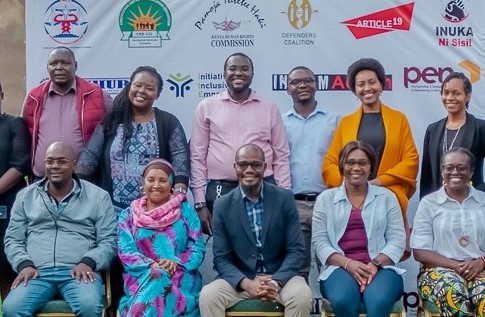Civil society leaders under the umbrella of Civic Freedoms Forum (CFF) met at Jacaranda Hotel in Nairobi to celebrate the commencement of the Public Benefits Organizations Act No.18 of 2013 through legal notice No.78 of 2024. The civil society leaders also met to build solid strategy for the implementation of the Act. According to Chris Mbiti, Executive Director of PEN Kenya, the coming to birth of PBO Act was initiated by PEN Kenya back in 2009 where the first people led by the then PEN’s Executive Director John Batten and other leaders of civil society organization started relooking at the Sessional Paper No. 1 of 2006 on NGOs. This was followed by the establishment of the Civil Society Organizations References Group (CSO-RG) which late became the Civil Society Reference Group (CSRG) which worked together with other networks meeting numerous bottlenecks until 2013 when the then President, the Late H.E Mwai Kibaki assented to the Bill. The law saw a series of push and pull that took 11 years and 4 months of struggle and efforts involving 2 court battles and dialogue between key Civil Society Organizations CSOs and the government. At last, PBO Act came into operation on 14th of May 2024 following the issuance of notice on commencement date by the government.
“In those days of struggle, PEN Kenya, KHRC and others used to mobilize resources among CSOs who synergized efforts and work tirelessly to see this act come into force despite the numerous frustrations by the previous regime, thank so much our partners for the continued collaborations and welcome on board,” said Chris Mbiti.
As the CSO leaders convene to strategize, Davis Malombe, CFF Chairperson and the Executive Director of Kenya Human Rights Commission (KHRC) laid emphasis on the need to relook at the gaps in the Act with the intention of review. He drew the attention of the leader to Re-registration of PBOs under Schedule 5; Transition of the NGO Council to the Federation of PBOs especially with the wrangles and illegitimacy; and Gaps on deregistration under Schedule 7. He also urged CFF leadership to be vigilant for the call for applications for appointment of members of the Board of the Authority by the Cabinet Secretary. He concluded by stating that there is the need for a PBO Summit in June 2024.
The team also unmasked some potential risks that the sector members need to be aware of including: fear of losing benefits already guaranteed in other regimes; housing of PBO Act under the Cabinet Secretary responsible for planning and national development as provided in the Act instead of being held under the Ministry of Interior National Administration; Potential amendments by the Government that may change the core objective of the Act; shrinking funding spaces for the PBOs affecting implementation of the Act; Resource challenges for the PBO Authority and Tribunals; Donors friendly to government requiring PBOs to comply with government political policy agenda like BETA; and lack of inclusivity in the transition process may cause schism and derailment of process among others.
As they wrapped up, the CSO leaders called for collaboration with other civil society leaders, government, and development partners to ensure they complete the priority tasks during the transition period. Some of these tasks include verification of the law involving legal analysis of the act: sensitization and public education including developing of IEC materials (Audio-visual/Animations, popular version & FAQs), online sensitization (X-spaces, webinars etc.), ToT for regional technical trainers and facilitate county and regional sensitization Forums. Joint coordination and collaboration in implementation; drafting of the Terms of Reference for the joint committee for implementation; consensus building on CSO representatives to the joint committee.






